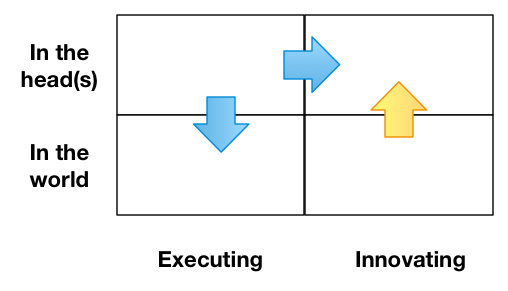A few weeks ago, I posted about laying out activities in a space dividing the execution side from the innovation side, and in the head from in the world. None of you took the bait about talking what it meant (I’m so disappointed), but it continued to ponder it myself. And at least one idea came to mind.
 So what I’m thinking is that the point is to not be using our heads to be doing simple execution. Machines (read: robots or computation agents) are very good at doing what they’re told. Reliably, and repeatably. They may need oversight, but in many ways we’re seeing this play out.
So what I’m thinking is that the point is to not be using our heads to be doing simple execution. Machines (read: robots or computation agents) are very good at doing what they’re told. Reliably, and repeatably. They may need oversight, but in many ways we’re seeing this play out.
What we should be doing is trying to automate execution. We aren’t good at doing rote things, and having us do them is silly. Ideally you automate them, or outsource them in some way. Let’s save our minds for doing important work.
Of course, many times the situations we’re increasingly seeing are not matters of simply executing. As things get more ambiguous, more novel, more chaotic, we’re really discovering we need to have people handle those situations in innovative ways. So they’re really being moved over regardless.
And, of course, we want that innovation to be fueled by data, information in the world being made available to support making these decisions. Big analytics, or even little analytics are good basis, as are models and support tools to facilitate the processes. And, of course, this doesn’t have to be all in one head, but drawing upon teams, communities, and networks to get solution.
The real point is to let machines do what they can do well, and leave to us what we do well. And, what we want to be responsible for. As I see it, the role of technology is to augment us, not replace us. It’s up to us to make the choices, but we have the opportunity to work in ways that align with how our brains really think, work, and learn. I reckon that choice is a no-brainer ;).
Leave a Reply